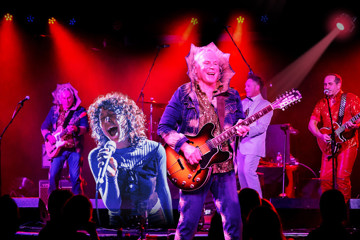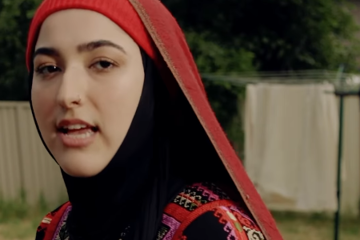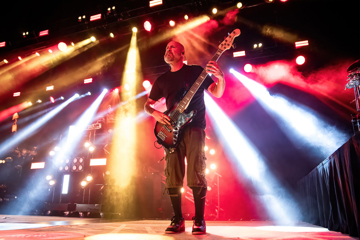How A Love Of Prog Rock & The Runaways United Foo Fighters
Are Foo Fighters still cool or just a bunch of "assholes driving around in limousines"?

To mark their 20th anniversary, Foo Fighters approached their eighth album, Sonic Highways, differently: each of the eight tracks were recorded in a legendary studio in a different American city, where the band worked with and met a variety of guests. Frontman Dave Grohl chose not to put any words down until the last day of recording, so that information he garnered from his interviews with local legends could inform the songs. Also, a Grohl-directed HBO documentary titled Foo Fighters: Sonic Highways – eight episodes, each one shining a spotlight on the musical history of a single city – is airing in the lead up to the album dropping worldwide on 10 November.
We find drummer Taylor Hawkins in Malibu. “I had practice and then I just wanted to jump in the ocean, so I jumped in the ocean,” he drawls. “I love the sun. I mean, it’ll kill ya eventually but, whatever. I’m already starting to shrivel, man, my skin’s already starting to look like a fucking baseball mitt.”
At his home in Los Angeles, California, Foo Fighters guitarist Pat Smear reflects on which Sonic Highways city he most connected with: “Um, New Orleans... Most places I go to [touring with Fooeys] we’re there a day, I don’t really get to know them. But because we were there for a week in every place, I really fell in love with all these cities. But New Orleans was super-special. And usually I’d just hide in my room when I’m in New Orleans... I don’t need to be hungover for the show,” he laughs.
Some of the legends Grohl interviews for the TV series are Dolly Parton, LCD Soundsystem’s James Murphy, Paul Stanley, Slash, LL Cool J and Buddy Guy. In New York, the Fooeys called upon Joan Jett, who produced guitarist Pat Smear’s iconic punk band Germs’ only album, 1979’s (GI). On whether Jett brought up any Smear stories that his bandmates would have previously been unaware of, the guitarist admits, “Sometimes ones [stories] that I don’t remember... Maybe she was lying, I dunno, hahaha.
“She was actually going to sing on the song, but we got so behind schedule that day – with lighting or cameras or whatever – that she finally got to the point where she had to leave and didn’t have time to sing on the song, so that was a bummer. But, you know, we’ve done some work together before, we’ll do it again.”
When Smear remembers the LA music scene around the time that Germs broke out, Jett’s groundbreaking all-girl group springs to mind. “The scene kinda revolved around The Runaways before punk rock, which was just before... So The Runaways was the inspiration for me and my best friend to start a band, because it was just that realisation like, ‘Hey, they’re the same age as us and they’re actually doing this, and playing great gigs at places that we like to go to’... It seemed so far-flung before that, you know, everybody was ten years older and played a way you knew you could never play, and just were these gods on a faraway stage. And The Runaways were just kids our age playing.”
"I was a kid in the ‘70s and it was just a lotta parties and a lotta music and a lotta drugs [laughs]."
Smear is a self-confessed Yes fan, so how much of a spin-out is it for him that Jon Davison, a childhood friend of Hawkins, has been fronting Yes since early 2012? “It was real exciting,” Smear acknowledges. “Me and Taylor just went to go see them play with him – Taylor’s buddy – singing. And it was surreal, but it was really great. It’s funny, a friend of mine called me today and said, ‘Hey, I’m doing an article for MOJO called ‘Prog Roots Of Punk Rock’, about how many really punk bands have their rock’n’roll roots in prog. And he started listing them off to me and I was like, ‘Oh, I had no idea,’ like, ‘Oh, really? The Sex Pistols? All these other bands love prog?’... We didn’t have punk rock, but the weirdo music we had was prog and it was just nuts. I mean, it was really appealing to, you know, the misfits my age.”
There was a “sort of Police-style band” where Hawkins grew up in Laguna Beach, California. “I loved ‘em,” he recalls. “I knew the drummer, he was, like, six or eight years older than me, and I would follow him around and he’d kinda give me little drum lessons here and there, you know?” Reggae was big where Hawkins lived, but he dug The Police. “I think that even The Police themselves would never call what they did reggae. I mean, it was sort of infused. They took aspects: they took the beat of reggae and added it to sort of rock music. I guess you could really call it more like ska. I really loved all the early-‘80s ska.”
Of Smear’s five older sisters, four “were all grown up and outta the house by the time [he] was born”, which left Smear growing up in the house with one sister. “From just hearing [music] through her bedroom door I discovered a lot of bands – that’s how I discovered Queen,” he allows. “She would just get a new record and play it to death for a week and so, whether I liked it or not, I got to know it really well.”
“The first concert I ever saw was Queen, my elder sister took me to that,” Hawkins tells. “And then after that I saw David Bowie on the Let’s Dance tour [fact check: it was actually called the Serious Moonlight tour]. I was, like, ten or 11, you know.” When asked whether he has any recollection of the first time he went out partying without parental supervision, Smear responds quickly, “No, I don’t at all. I was a kid in the ‘70s and it was just a lotta parties and a lotta music and a lotta drugs [laughs].”
From the first time Smear heard rock’n’roll, around the age of 12, he knew right away he wanted in and discovered early on the importance of surrounding yourself with the right people. “It’s everything,” he opines. “I learnt that from my first band: take the band by who you wanna be with. Everybody can improve or get better, you know, I wouldn’t go out and be in a band with four strangers that all played really well. I mean, you should just be in a band with your mates and whoever needs to get better will get better or whatever, but I think that’s the most important part.”
In the Foo Fighters: Sonic Highways trailer, Grohl says, “You can tie all these places and people together with these sonic highways.” This quote prompts a conversation about how music connects us. “It’s not dissimilar to the Germs logo,” Smear observes. “When we were kids and had a band we had a logo, which was just a blue circle, and it really meant the same thing as the sonic highways... everything’s connected and just that whole crazy musical thing that happens.”
Play It Cool
Foo Fighters traverse new territory with their Sonic Highways songwriting/recording approach, and creating a HBO series to pique fan excitement also sets a precedent, which leads Bryget Chrisfield into a discussion with drummer Taylor Hawkins about U2’s blighted promo campaign: “[Songs Of Innocence] just kinda sounds like a fart any way you listen to it.”
Don't miss a beat with our FREE daily newsletter
"What happened to U2, man?” Hawkins thinks aloud. “I don’t think people are that hyped on them.” This probably has something to do with the fact that our ears were forced to digest their latest, 13th album Songs Of Innocence in a similar fashion to the aversion therapy A Clockwork Orange’s teenage protagonist Alex endured while being forced to watch violent images for long periods while his eyes were held open with specula. “Yeah! Kinda like the musical version of that,” Hawkins plays along. “I liked all the YouTube footage of all the crap: ‘What the fuck is this shit doin’ on my phone, dog? Get this shit off my phone, dog!’ Haha, it was like, HAHAHAHAhahaha.
“I mean, I think they probably thought it was gonna be a great idea, ‘Here’s the deal: everybody who has an iPhone, gets your record. And they get it for free!’ And they thought, probably, ‘Well that’s pretty awesome!’ but they didn’t really take into consideration the Big Brother feeling that kinda goes along with like, ‘[In menacing voice] You have the new U2 record’... You couldn’t get rid of it and they actually had to come up with an app to get rid of it, that’s horrible.
"What happened to U2, man?"
“I don’t know that any of that new album has anything great on it,” Hawkins continues. “I listened to it once, but it’s so marred by that whole sort of, like I said, Orwellian, 1984 extreme that it just kinda sounds like a fart any way you listen to it.”
Our conversation prompts Hawkins to ponder Foo Fighters: Sonic Highways, the visual means for promoting his band’s music. “You know, it’s so hard for me to even have a point of view. I mean, I dunno, maybe some people will go, ‘[In douchebag voice] Oh, wow! Foo Fighters have an HBO series. Oh, what, are they fuckin’ movie stars now?’ I mean, who knows? Some people will think that, you know. We’re obviously not the underdogs anymore necessarily.
“And so, you know, I think of U2 in that position and it kinda feels – I can’t really say I feel sorry for them, because you can’t feel sorry for a band that owns a hotel,” he laughs, “but I think at the end of the day they’re still probably a band that want people to like their music so, I dunno. I mean, they’ll go out and do some fuckin’ stadium tour and everybody will buy tickets and then they’ll be fine, you know.” The realisation that you’re no longer cool has still gotta be hard for a band deal with. “Of course,” Hawkins agrees, “and nobody wants to be the butt of a joke, you know. And it’s hard to remain cool and still be a big band, that’s hard to do. Are The Stones cool still?” Always. “I guess so.” Keith Richards is way cool. “Yeah, of course he is.” Then Hawkins takes it there: “But, let me ask you, do you think that we’re not cool anymore?” Amazingly cool. “BE honest, be honest!”
“You guys come across as really regular and very approachable and that’s important.” Hawkins lets this sink in: “I guess so. Well that’s all a sham, you know that. We’re all assholes driving around in limousines [laughs].”







